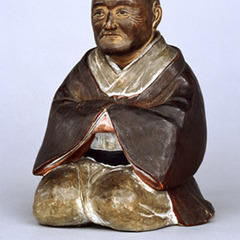Ueda Akinari
Ueda Akinari (Jap.上 田 秋成, Wayaku taro, Senshi Kijin, Ueda Mucho; * July 25, 1734 in Osaka, † August 8, 1809 in Kyoto ) was a Japanese writer and philologist.
Life
Ueda was born as the son of a prostitute adopted in 1737 by the merchant Ueda Mosuke. In the next Jehr he contracted smallpox, as a result he got crippled hands and live long suffered from poor health. He began studying literature at the Kaitokudō School in Osaka and he began to write haiku. After the death of his stepfather in 1761 he took over the paper shop, but he lost two years later by a fire.
Now penniless, he went with his wife and his adopted daughter after Kashima -mura and studied medicine there. He opened a medical practice, but because of his own health problems never prospered, so he finally gave in 1788. In 1793 he went to Kyoto, where his wife died in 1797, while he went blind.
Ueda became famous Ugetsu monogatari dated by (雨 月 物语), in 1768, appeared in 1990 in German translation of Oscar Benl under the title Under the Moonlight and Rain. Fantastic stories. a collection of ghost and mystery stories, which earned him a reputation in the West of a Japanese Edgar Allan Poe and the posthumous collection harusame Monogatari (春雨 物语) has continued. As an essayist, he was known for his sharp-tongued confrontations among others with Motoori Norinaga. At the age he published two collections of his essays and essays under the titles Kinsa (1804 ) and Tandai Shoshin roku (1808 ).
Swell
- Viktoria Eschbach- Szabo: People and name in Japanese: changes in the modernization and globalization. LIT Verlag, Münster, 2009, ISBN 978-3-8258-8758-2, pp. 242-43.
- Bruno Lewin: Small dictionary of Japanese studies: the cultural history of Japan. 3rd edition. Otto Harrassowitz Verlag, Wiesbaden 1995, ISBN 3-447-03668-0, p 521
- ENotes - Ueda Akinari
Comments
- Author
- Short story
- Essay
- Poetry
- Literature (Japanese)
- Japanese
- Born in 1734
- Died in 1809
- Man










